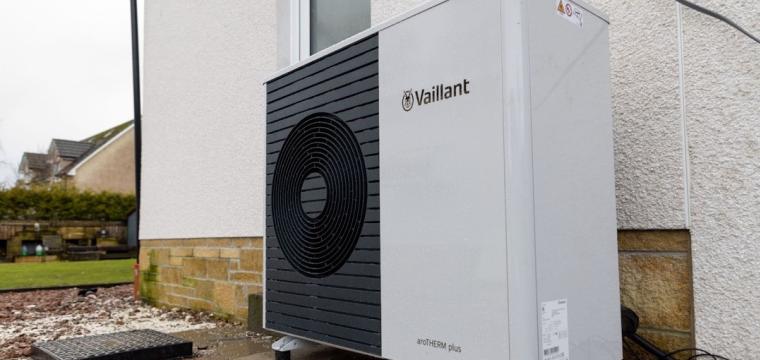Guest article from Andy Regan, senior mission manager, Nesta
Making your home more energy efficient can help you lower your carbon footprint and save on your energy bills. One of the most impactful measures you can install to reduce your home’s carbon emissions is a heat pump. But what is a heat pump exactly? How do heat pumps work? And are heat pumps worth it?
Andy Regan, Senior Mission Manager at Nesta, has put together this easy-to-read guide to help homeowners understand how heat pumps work, what they can do and why they might be the right choice for your home.
For many people heat pumps might be a new idea, but Nesta is committed to helping homeowners understand this technology and making it more affordable and accessible for everyone. Nesta supported us in the research and market testing of our new Green Homes Wales scheme, which will help eligible homeowners make energy efficiency improvements to their homes.
Why are heat pumps important for the environment?
We all know how important it is that we take action on climate change. But often when we think about cutting carbon going into the atmosphere we think about emissions from things like power stations, planes or cars - so it might be a surprise to learn that one sixth of carbon emissions in the UK are actually generated by our homes.
That means that in order to meet our carbon emissions targets, we have to change how we heat where we live.
Eventually the UK will need to move away from using fossil fuels and Nesta believes the best way to reduce the country’s home carbon emissions will be to replace gas boilers and other traditional heating systems with heat pumps.
What is a heat pump?
A heat pump is a device that collects the naturally occurring heat that is in the air, ground, or water outside a home, compresses it, and then moves it into your radiators. The device uses electricity to power this process, but unlike traditional heating systems, it doesn’t burn fossil fuels to generate heat, meaning it does not produce direct carbon emissions at your property.
As the electricity grid continues to decarbonise, heat pumps will become even greener. In fact, for every unit of electricity they use, heat pumps typically produce three to four units of heat, making them a much more efficient option than conventional gas or oil boilers.
Why choose a heat pump?
Switching to a heat pump offers several benefits that can make a big difference for your home, your wallet and the planet:
Cut your carbon footprint
Heat pumps have one of the highest carbon savings per pound spent compared to other low-carbon technologies. With the growing urgency to tackle climate change, switching to a heat pump could be one of the most impactful actions you can take for a more sustainable Wales.
Improve your health at home
Traditional heating systems, especially those that use gas or oil, can contribute to indoor air pollution. Heat pumps don’t produce combustion emissions inside your home, helping to create a cleaner and healthier living environment.
Financial support
There are a range of grants and incentives available to help with the cost of installation, including the Green Homes Wales scheme. You can also switch to a special heat pump tariff to save money.
Future-proof your home
As Wales aims to achieve its net-zero targets, fossil fuel heating systems will gradually be phased out. By switching to a heat pump now, you’re getting ahead of the curve.
Heat pump case studies
Wales has a unique opportunity to lead the transition to greener heating solutions. In Carmarthenshire, Adrian made the switch to a heat pump in his 1800s-built stone house. Despite the age of the property, the heat pump has made it more efficient and comfortable throughout the year. You can read more about Adrian's experience on the get a heat pump website.
Heat pump FAQs
Do heat pumps work in cold weather?
Yes, they do. There’s still heat energy in the air or ground that heat pumps can use, even in weather below freezing. Research using field data from the UK, Germany, Switzerland, Canada, the US and China found that heat pumps still perform efficiently and effectively at temperatures well below freezing.
Are heat pumps a new technology?
Heat pumps were invented in the late 19th century. They are widely used in Europe and Japan, in often freezing and relentless weather conditions. In Norway, 60% of households use heat pumps.
How loud are heat pumps?
All heating technologies make some noise. However, most heat pumps are no louder than a gas boiler, and ground source heat pumps are generally even quieter. Findings from a recent survey found that the majority of owners felt that their heat pumps were unobtrusive, with 85 per cent being satisfied with noise levels.
Do I need lots of insulation to make a heat pump work?
Insulation will improve the heat efficiency of any home, but heat pumps can work efficiently without vast amounts of retrofitting and insulation. The important thing to note is, as with larger homes requiring different kinds of gas heating, installers need to choose the appropriate heat pump to match the characteristics of the property.
Which heat pump should I get?
There are different types of heat pumps available, which use different heat sources (air, ground or water) or different ways of heating your home, such as via radiators, underfloor heating or by releasing warm air into your home. Nesta have created a quiz to help you determine which heat pump could be best for your home.
Is there any financial support?
There are a growing range of financial incentives for homeowners who are looking to purchase a heat pump. The main grant Scheme for homeowners in Wales is the Boiler Upgrade Scheme.
Will a heat pump save me money?
If you have an oil, LPG or electric boiler, electric radiators or storage heaters, you may make a saving on your energy bills. . If you are currently using a gas boiler, your heating bills will likely remain similar after installing a heat pump. This is because government policy currently makes gas cheaper than electricity.
However, making use of special energy tariffs can help. According to Which?, you could save more than £500 a year on your energy bills by switching to a heat pump from a gas boiler and using a special heat pump tariff.
Want to find out more?
Visit https://www.getaheatpump.org.uk/ to learn more about the costs, the financial support and advice surrounding getting a heat pump installed.
If you’re looking for financial support for a heat pump or other green measures, the Green Homes Wales scheme may be able to help. It offers fully funded expert support, interest-free loans and in some cases grant funding to make home energy efficiency more affordable. Please visit our Green Homes Wales page for more information and to register your interest.

Andy Regan
Senior Mission Manager, sustainable future mission
Andy works within the Nesta Cymru team as mission manager for a sustainable future.
Since joining Nesta in 2021 he has led a project on retrofit finance in partnership with the Development Bank of Wales, and a collaborative project with Centre for Net Zero on heat pump flexibility.
Andy has a background in energy policy in roles at Ofgem and Citizens Advice - where he co-chaired the Fuel Poverty Coalition Cymru. He joined Nesta from the independent think tank the Institute of Welsh Affairs, where he oversaw their policy and external affairs work.
Outside work most of his interests revolve around music, including being guitarist in Welsh indie-pop band The School.

